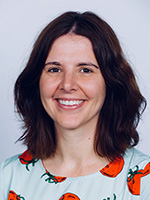Teaching Institute: Preparing the Next Generation of Scientists to be Best Practice Educators
Thursday April 29, 2021
1:30 pm
-
3:00 pm
Central Time (CT)
View session on the EB Virtual Platform (EB registration required)
BEH
DPE
Chair :
 Nicole Kwiek
Nicole Kwiek
Ohio State University
Too often, academic scientists paradoxically demand the highest rigor of evidence for their research projects but then instruct students according to non-evidence-supported practices (including teacher- centered instruction such as lectures). Additionally, as the field of science continues to struggle with underrepresentation by minority groups, even experienced educators need development in creating inclusive learning environments for students of diverse race/ethnicity, socioeconomic background, sexual orientation, gender identity and expression, age, ability, religion, national and geographical origin, and language. As higher education moves toward an expectation of effective learner-centered teaching for all students, it is imperative that universities, colleges, departments, and programs offer appropriate training in and practice of evidence-based, inclusive instructional strategies for their faculty, staff, and graduate students. In this symposium, participants will learn about innovative strategies and programs to theoretically and experientially develop science faculty and future faculty in best practice teaching, including how to create an educational environment where all students feel valued and have equal access to learn. The speakers come from a multitude of disciplines and academic rank to share their expertise and personal experiences. Interactive strategies will be employed to deliver the content.
NOTE: In order to utilize the full functionality of Zoom, please download or update to the latest version of Zoom.
Speakers
Nicole Kwiek
- Ohio State University
From Bench Top to Blackboard: Developing Skills in Best Practice Teaching
Overviews data indicating needs for teaching development and diversity efforts in STEM; defines evidence-based teaching experiences and practices (including concrete examples).
Laverne Melon
- Wesleyan University
Evidence-Based Strategies for Creating Inclusive STEM Classrooms
Describes an inclusive classroom; shares best practices for culturally responsive teaching, particularly for STEM settings; showcases techniques in a case study-type format.
Patricia O'Sullivan
- University of California, San Francisco
Educating Our Future Educators: A Health Professions Education Pathway for Students, Residents and Fellows
Overviews the Health Professions Education Pathway, which trains future educators from all health professions fields to promote excellence in teaching, translate theory and novel strategies to the learning environment, and expand knowledge in the field of health professions education.
Katherine Gruenberg
- University of California, San Francisco
Educating Our Future Educators: A Health Professions Education Pathway for Students, Residents and Fellows
Overviews the Health Professions Education Pathway, which trains future educators from all health professions fields to promote excellence in teaching, translate theory and novel strategies to the learning environment, and expand knowledge in the field of health professions education.
Justin Habash
- Johns Hopkins University
Practice without Preaching: Faculty Development and the Science of Learning
Strategies for using evidence from educational and organizational research to develop more effective faculty teaching development programs that can shift departmental teaching cultures toward broader use of best practices and more meaningful learning experiences for students.